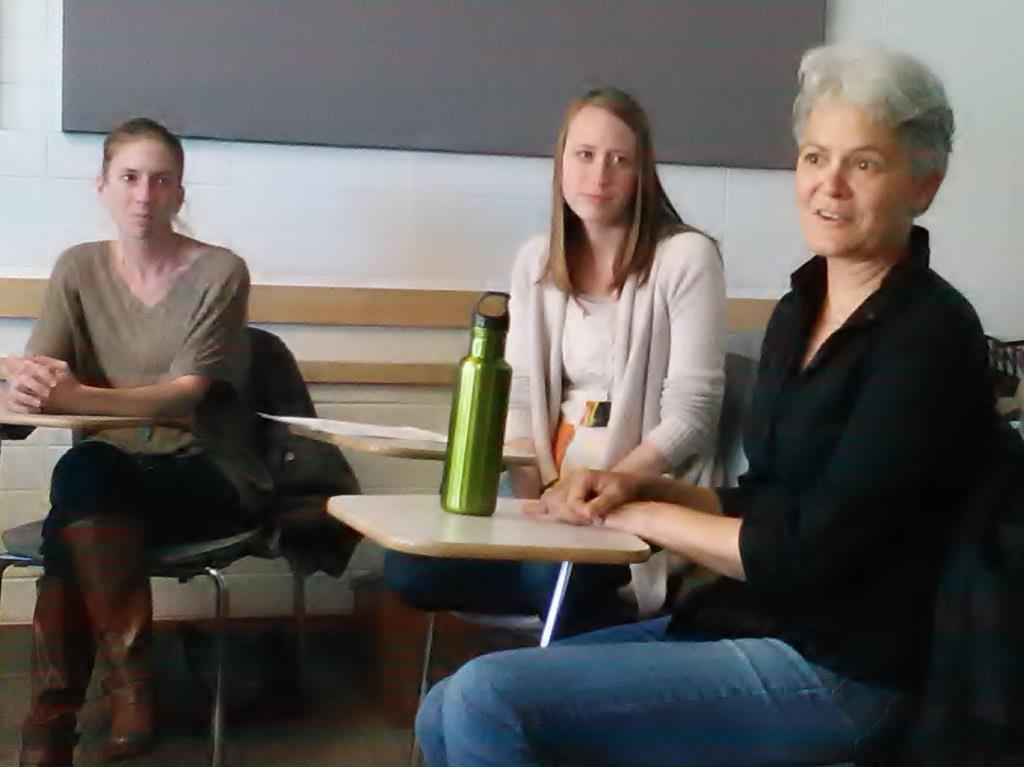~from English Department Communications Intern Joyce Bohling
Thinking about applying to graduate school in English or another liberal arts field?
Last Friday, a panel consisting of Academic Success Coordinators Joanna Doxey and Sarah Wernsing, along with Professor Ellen Brinks, presented to an audience of undergraduate students to address questions and concerns about the application process.

Here are 9 key tips from their presentation:
- Be prepared to write a lot. In order to be successful in a humanities graduate program, “you have to love writing and be a stickler for perfection,” said Professor Brinks.
- Know what kind of program you’re looking for. If your goal is to become a professor, applying straight to a Ph.D. program is a smart choice. On the other hand, Wernsing and Doxey added that for those interested in a career outside of the academy, and for those who are considering an academic career but aren’t certain, an M.A. or M.F.A. is often the better option.
- Do your research. Talk to your professors about programs they’d recommend. Look for programs that have faculty with whom you’re interested in working and preferably at least two or three faculty in your field of interest. If you can, visit campus
- Think about the kind of community you want. Wernsing explained that, while there are many benefits of highly-ranked, prestigious programs, they can also be very “cut-throat.” Depending on your goals and priorities, you may have just as much success in a less-prestigious program that nonetheless offers a quality education and lots of collaboration and camaraderie among its students.
- Save your English papers. Not only is a writing sample required in many applications, but it can help the instructors who write your letters of recommendation recall your work. Keep copies of papers with your instructor’s annotations and revise according to their suggestions. Having a strong writing sample is key to being accepted into any liberal arts program, Professor Brinks emphasized.
- The personal statement should be about your future, not your past. Use the personal statement to discuss your academic and career goals and explain the steps that you’ve taken towards those goals. Do not tell stories about your childhood, or mention your childhood at all, for that matter. “Any time you can talk about scholarly discussions in the field,” talk about them, said Professor Brinks.
- Know how much money you’re willing to put down. The panelists discussed various approaches to funding graduate school. Whereas many Ph.D. programs have funding for most or all of their students, funded positions such as graduate teaching assistantships can be harder to find in master’s programs. Doxey shared that she chose to attend CSU for its location and sense of community, even though the program didn’t offer her funding; however, she had worked for six years before coming to graduate school and had savings to pay for her M.F.A. Think carefully before taking out loans.
- The job market is tough, but not as dire as you might think. You will likely be able to obtain a variety of jobs with your degree, both within and beyond academia. If you want to teach and do research at a college or university, there are tenured and tenure-track positions, as well adjunct teaching positions, at both 4-year and 2-year institutions. Currently, about 80% of people with Ph.D.’s are eventually able to find tenure-track jobs. In the private or non-profit sector, employers often consider an M.A. a more generalized degree that nonetheless shows a high level of commitment, and applications with master’s degrees often stand out as candidates.
- Look for programs that offer professionalization opportunities. Internships, such as that offered here at CSU at the Center for Literary Publishing, can offer gateways into careers, especially for those who aren’t looking to become professors.